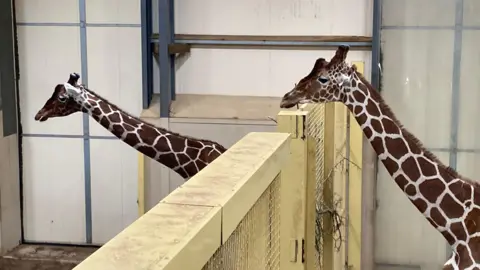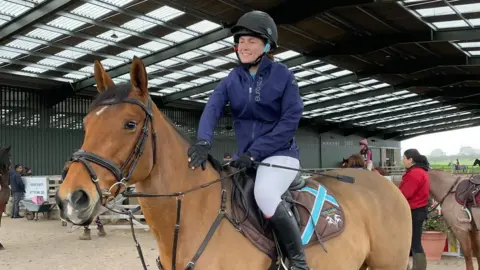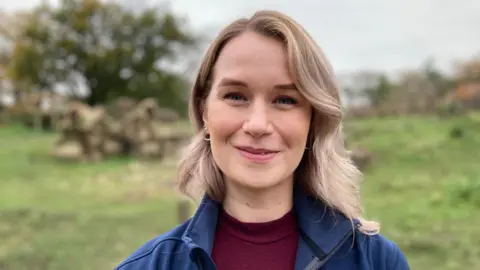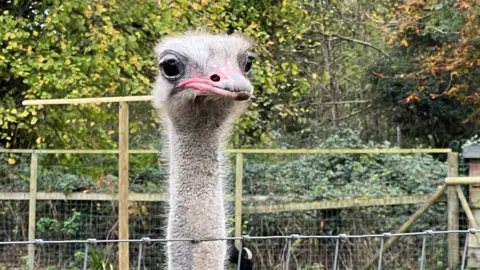Bonfire night 'catastrophic' for horses and zoos
 BBC
BBCThe dazzling sights of bonfire night may be exciting for those attending displays, but for horses, zoo animals and livestock, the impacts can be "catastrophic".
On average, more than 100 horses were killed or injured every year in the UK between November 2010 and March 2024 due to incidents involving fireworks, according to the British Horse Society.
"There's no such thing as a wildlife-friendly firework," said Dr Sarah Richdon, of the Bristol Zoological Society.
The RSPCA has called for firework restriction zones in England and Wales, while a vet has urged people to inform nearby stables of planned displays.
Dr Millie Tingey from Cheltenham Equine Vets has seen "catastrophic injuries" in horses when their owners have not been warned of displays.
"We've seen horses going through fences, we've had a horse break its leg and unfortunately have to be put to sleep," she said.
Dr Tingey said, regardless of physical injury, a lot of horses are "really sensitive" to loud noises, not just fireworks.
She encouraged owners to keep horses in their normal routine "as much as they can", and said vets can prescribe sedation.
 Millie Tingey
Millie Tingey"Coming from a veterinary and a horse owner point of view, what we'd push for is letting your neighbours or any local yards know if you're having a private or less-advertised display," Dr Tingey said.
"Even within a couple of miles, a lot of the time they are still loud enough to spook the horses.
"If horse owners have a chance to take the necessary precautions beforehand, it can really make a massive difference in preventing injury and stress for the animals."
Firework debris in enclosures
Dr Richdon, programme lead for animal behaviour and welfare at Bristol Zoological Society, said there is "a lot less disruption" for animals at the Bristol Zoo Project in South Gloucestershire, compared to their old home in Clifton.
CCTV footage at the former site showed animals being woken up through the night, and lions being unable to get up the following day due to tiredness.
"We had our red vented cockatoos plucking feathers overnight because they were stressed from noise," Dr Richdon said.
"We would find debris from fireworks in animal enclosures, and our keepers have to be really diligent on removing every scrap because of the toxic chemicals."

Even if the animals were not physically injured, Dr Richdon said it is hard to mitigate the "mental distress" caused to exotic animals by fireworks.
"We try to make the indoor spaces as inviting as possible, we put in deep bedding, we keep them warm," she said.
In Dr Richdon's view, as fireworks "are a big part of British culture", a balance "needs to be struck".
She suggested a limit on the decibels of fireworks sold in the UK.

'Protect animals and people'
Dr Mark Kennedy, an equine expert from the RSPCA, said looking after horses on 5 November can be more challenging than protecting other pets, as horses can get injured if they panic in their stables.
Quiet fireworks, light displays, and a review of fireworks legislation, including restricting them to certain dates, are just some of the things the RSPCA is asking for.
"Scotland has brought in firework control zones, which councils can put in place to prevent fireworks to be let off in places where horses are kept, sensitive wildlife zones, and around care homes," Dr Kennedy said.
"We would really urge the English and Welsh governments to think about following Scotland's lead.
"We really need a complete review of fireworks regulations and to protect animals and people from the stress of fireworks."
Follow BBC Bristol on Facebook, X, and Instagram. Send your story ideas to us on email or via WhatsApp on 0800 313 4630.
